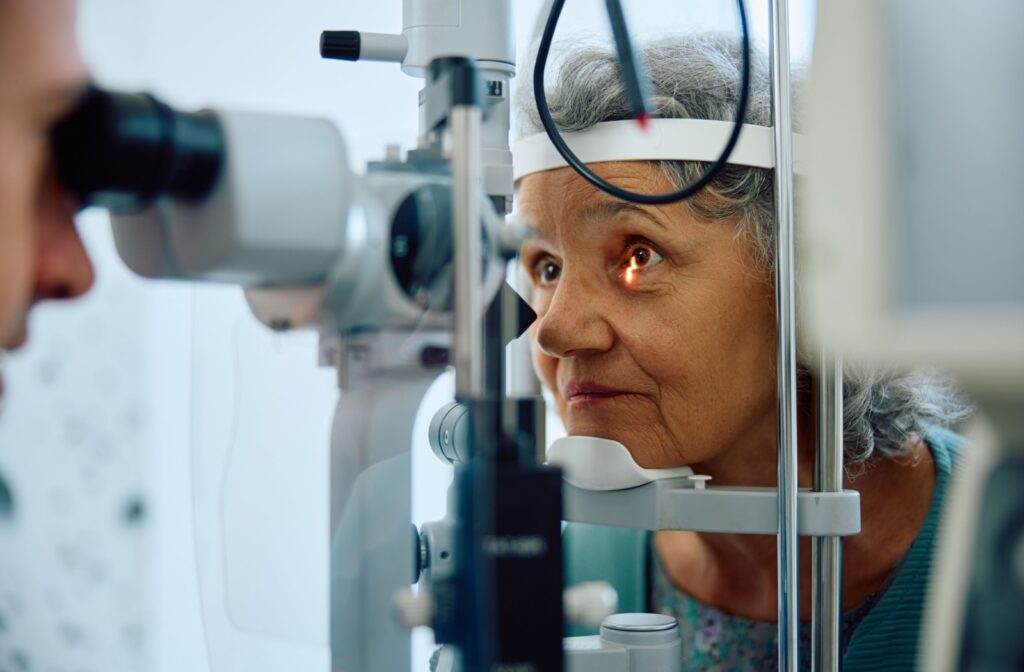You feel that familiar pressure building behind your eyes, and your head feels heavy with congestion. It’s a common feeling for anyone who has experienced a sinus infection or allergies. When your vision starts to seem a little off at the same time, it’s natural to wonder if the 2 are connected and if it’s time for an eye exam.
It’s a question we hear often, and the short answer is yes, sinus problems can affect your vision. Because your sinuses are so close to your eyes, inflammation in one area can lead to discomfort in the other. Understanding this connection can help you recognize the signs and find relief.
The Close Connection Between Your Sinuses and Eyes
Your sinuses are a network of hollow, air-filled spaces within your skull. They sit right next to your eyes, which explains why sinus trouble can cause eye discomfort. Their main purpose is to create mucus that keeps the air you breathe clean and moist.
Where Your Sinuses Are Located
These cavities are located in 4 key areas around your eyes:
- Frontal sinuses: Above your eyes, in the forehead area.
- Maxillary sinuses: Below your eyes, in your cheekbones.
- Ethmoid sinuses: Between your eyes, near the bridge of your nose.
- Sphenoid sinuses: Behind your eyes, deeper in your skull.
How Sinus Inflammation Affects Your Eyes
When the lining of your sinuses becomes inflamed, a condition known as sinusitis, it can cause problems. This swelling often blocks mucus from draining properly. This blockage creates the pressure you feel, which can sometimes lead to sinus-related headaches and discomfort behind your eyes.
Common Signs of a Sinus Infection
In addition to eye discomfort, you may also experience other familiar signs, such as:
- Facial pain or pressure
- Headaches
- Thick, discolored nasal discharge
- Reduced sense of smell or taste
- Congestion or a stuffy nose
- Postnasal drip
Eye and Vision Symptoms Caused by Sinus Pressure
The pressure from swollen sinuses can push on the nerves and muscles that control your eyes. This can result in a few different uncomfortable vision issues. While they are usually temporary, it’s helpful to know what to look for.
Pain and Pressure Around the Eyes
A persistent, dull ache behind or around your eyes is a frequent symptom of sinus pressure. The inflammation can make the entire area feel tender. This discomfort can feel like a headache, but it is often focused near the eye sockets.
Blurry Vision or Seeing Double
This pressure can sometimes make it difficult for your eyes to focus clearly. Your vision might seem blurry or less sharp than usual. In some instances, it can also affect eye muscle coordination and cause temporary double vision.
Dryness, Redness, and Watery Eyes
Sinus inflammation can also disrupt your tear production and drainage. The small passages that drain tears can become blocked, leading to watery eyes. At the same time, the irritation can contribute to symptoms of dry eye disease and make them appear red.
Ways to Find Relief From Sinus-Related Eye Issues
If you are experiencing eye discomfort due to sinus issues, a few simple steps can offer relief. The goal is to reduce sinus inflammation. This should help ease the pressure on your eyes.
Simple Steps to Take at Home
These actions may help soothe your symptoms while your body recovers:
- Warm compresses: Place a warm, damp cloth over your eyes and nose to help soothe pain and pressure.
- Saline nasal sprays: Use a saline spray to help moisten your nasal passages and promote drainage.
- Staying hydrated: Drink plenty of fluids to help thin mucus.

Why You Should See an Eye Doctor
While most eye symptoms from a sinus infection resolve on their own, you shouldn’t ignore changes in your vision. A comprehensive eye exam can help determine if sinus pressure is the cause or if there’s another issue. As your local eye doctor, we can help you get a clear picture of your eye health.
Check for Underlying Eye Conditions
We can evaluate your vision and eye health to confirm if the symptoms are related to your sinuses. An exam checks that no other conditions are present. This helps you receive the appropriate care for your specific situation.
What to Do for Sudden Vision Changes
It’s important to know when to see an eye doctor versus seeking urgent care. If you notice any sudden or severe vision changes, seek care right away. Symptoms such as intense pain, significant swelling, or a rapid decrease in vision may indicate a more serious concern. Prompt attention is important in these situations.
Get Relief and Clarity for Your Vision
Sinus pressure and eye discomfort often go hand in hand, but you don’t have to guess about your vision. Understanding the connection can help you find relief and peace of mind. If you have concerns about your eye health, the team at Total Vision Richmond is here to help you see clearly.
Schedule a visit today.


